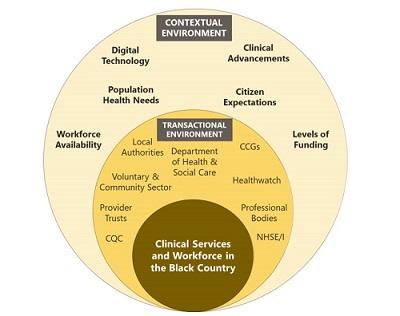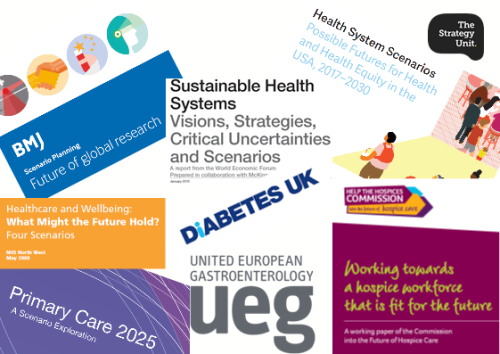The future is highly uncertain. Unless we consider the diverse factors that could affect health, our plans will lack creativity and sustainability.
The challenges facing NHS systems are headline news: NHS structures are frequently the subject of organisational change; new policy directives; funding allocations are determined on a relatively short term basis; and the impacts of the wider contextual environment cannot be accurately predicted (e.g. how patterns of trade, competition and migration may change; what technological advances will be made; how public attitudes towards health and care may shift; and how the supply and culture of the workforce will evolve).
‘Futures thinking’ is an important part of planning, helping us to imagine what different futures might bring. Scenarios are imaginative but realistic descriptions of potential futures and the wider forces that shaped them. They are a tool for learning at any stage of planning and delivery, and are of proven value in helping organisations and systems to:
- Re-frame their thinking about future priorities;
- Assess risk and mitigate their biases;
- Reduce the likelihood of failure and avoid blinkered thinking; and
- Increase their resilience and agility in a complex & changing environment.
The Strategy Unit has unique NHS expertise and experience in futures thinking, and our most recent futures project was commissioned by the Black Country’s Local Workforce Action Board, in partnership with the STP Clinical Leadership Group. The aim of this work was not to predict the future but, through exploring a diverse set of plausible futures, to generate practical responses that would increase the effectiveness, resilience and agility of local plans, as well as providing additional assurance to regulators.
We are also keen that other organisations and systems are able to benefit from this work. The following resources may be freely used by the NHS and other public and third sector organisations. No further permissions are required but appropriate acknowledgement should be given to the Strategy Unit as the source of the materials. These include Part 1 of our report, which explores the key forces likely to affect clinical services and the associated workforce between 2020-2030 and Part 2 of our report, detailing the scenarios we created and stakeholder reflections on them. Moreover, there is a Scenarios Toolkit that has been prepared as a ready-to-use workshop resource, enabling groups to engage in futures thinking, as recommended by the Chief Medical Officer, and to generate their own insights. No expert knowledge is required, and any staff or other stakeholders should be able to participate.
If you are interested in our other scenario planning work, please follow the link here. Also, if you would like access to the PowerPoint version of the Scenarios Toolkit, please email alysia.dyke@nhs.net.



